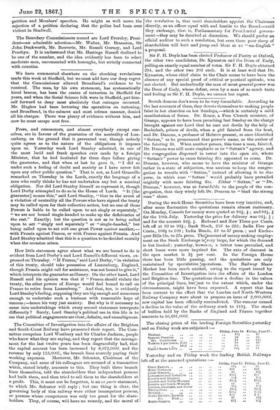Peers, and commoners, and almost everybody except our- selves, are
in favour of the guarantee of the neutrality of Lux- emburg, on the ground that it prevented war, though nobody -quite agrees as to the nature of the obligations it imposes upon ns. Yesterday week Lord Stanley admitted, in one of the most lucid and frank speeches ever made by a foreign Minister, that he had hesitated for three days before giving 'the guarantee, and that when at last he gave it, " I did so under such a feeling of doubt and anxiety as 1 have never felt upon any other public question." That is not, as Lord Granville remarked on Thursday in the Lords, exactly the language of a man who really thinks he has not undertaken any but a nominal -obligation. Nor did Lord Stanley himself so represent it, though Lord Derby attempted to do so in the House of Lords. " It [the guarantee] means this," said Lord Stanley, "that in the event of a violation of neutrality all the Powers who have signed the treaty may be called upon for their collective action, but no one of those Powers is liable to be called upon to act singly or separately," -" we are not bound single-handed to make up the deficiencies of the rest." Exactly; but the question is not as to being called upon to act "singly and separately" or "single-handed," but being called upon to act with one great Power against another,— 'with Prussia against France, or with France against Prussia. And .Lord Stanley admitted that this is a question to be decided morally -when the occasion arises.






























 Previous page
Previous page